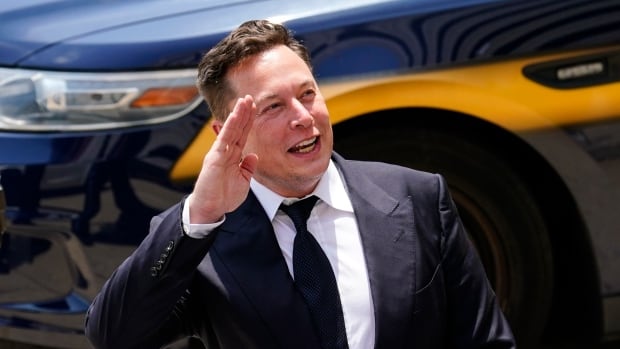While still grappling with the fallout from a company he did take private, beleaguered billionaire Elon Musk is now facing a trial over a company he didn’t.
Long before Musk purchased Twitter for $44 billion US in October, he had set his sights on Tesla, the electric automaker where he continues to serve as CEO and from which he derives most of his wealth and fame.
Musk claimed in an Aug. 7, 2018, tweet that he had “funding secured” to pay for a $72-billion buyout of Tesla, which he then amplified with a follow-up statement that made a deal seem imminent.
But the buyout never materialized and now Musk will have to explain his actions under oath in a U.S. federal court in San Francisco. The trial, which begins on Tuesday with jury selection, was triggered by a class-action lawsuit on behalf of investors who owned Tesla stock for a 10-day period in August 2018.
The shareholders have not specified the damages, but said Musk’s tweets cost investors “billions.”
Change of venue bid rejected by judge
Musk’s 2018 tweets fuelled a rally in Tesla’s stock price that abruptly ended a week later, after it became apparent that he didn’t have the funding for a buyout. That resulted in him scrapping his plan to take the automaker private, culminating in a $40-million settlement with U.S. securities regulators that also required him to step down as the company’s chair.
Front Burner25:36Tesla’s stock is tanking. Here’s why
Not long ago, Tesla seemed unstoppable. But Elon Musk’s electric vehicle juggernaut closed out 2022 as the worst-performing stock among the most valuable tech companies — and its shares have dipped even lower since then. Today, Patrick George — a contributing writer with Vox Media’s The Verge and an editor with The Autopian — joins us for a look at where things went south for Tesla, and the hurdles the company faces going forward.
Musk has since contended he entered that settlement under duress and maintained he believed he had locked up financial backing for a Tesla buyout during meetings with representatives from Saudi Arabia’s Public Investment Fund.
The trial’s outcome may hinge on the jury’s interpretation of Musk’s motive for tweets that U.S. District Judge Edward Chen has already decided were a falsehood and “reckless.”
Chen on Friday rejected Musk’s bid to transfer the trial to a federal court in Texas, where Tesla moved its headquarters in 2021. Musk had argued that negative coverage of his Twitter purchase had poisoned the jury pool in the San Francisco Bay Area.
Musk’s leadership of Twitter — where he has gutted the staff and alienated users and advertisers — has proven unpopular among Tesla’s current stockholders, who are worried he has been devoting less time to steering the automaker at a time of intensifying competition.
Those concerns contributed to a 65 per cent percent decline in Tesla’s stock last year that wiped out more than $700 billion in shareholder wealth — far more than the $14 billion swing in fortune that occurred during the August 2018 period covered in the class-action lawsuit.
The lawsuit is based on the premise that Tesla’s shares wouldn’t have traded at such a wide range if Musk hadn’t dangled the prospect of buying the company for $420 per share. The shares closed last week at $122.40.
High-profile names on witness list
After Musk dropped the idea of a Tesla buyout, the company overcame a production problem, resulting in a rapid upturn in car sales that caused its stock to soar and minted Musk as the world’s richest person until he bought Twitter.
The trial is likely to provide insights into Musk’s management style, given the witness list includes some of Tesla’s current and former top executives and board members, including Larry Ellison, Oracle co-founder, as well as James Murdoch, the son of media mogul Rupert Murdoch.
The drama also may shed light on Musk’s relationship with his brother, Kimbal, who is also on the list of potential witnesses in a trial scheduled to continue through Feb. 1.
It’s unusual for such a case to proceed all the way to a verdict. Hundreds of U.S. securities class actions have been filed every year since 1996, but only 15 resulted in trial verdicts since then, according to the Wolf Popper law firm.
Around half are dismissed for failing to comply with securities law, and most of the rest are settled.
Musk, also the CEO of SpaceX and a co-founder of companies OpenAI and Neuralink, is no stranger to the courtroom.
He beat a libel case in 2019 before a California jury over claims he defamed a cave explorer from the famous Thailand rescue when he referred the man as “pedo guy” in a tweet.
He also won a bench trial in Delaware’s Court of Chancery last year over claims by Tesla shareholders that he allegedly coerced the Tesla board into buying SolarCity, a rooftop solar panel maker. Tesla shareholders have appealed the verdict.
Last year, he fought an ultimately losing battle to wriggle out of his deal to buy Twitter, and he defended his $56 billion Tesla pay in a bench trial. Both of those were in the same Delaware court and a ruling is expected later this year on his pay package.


